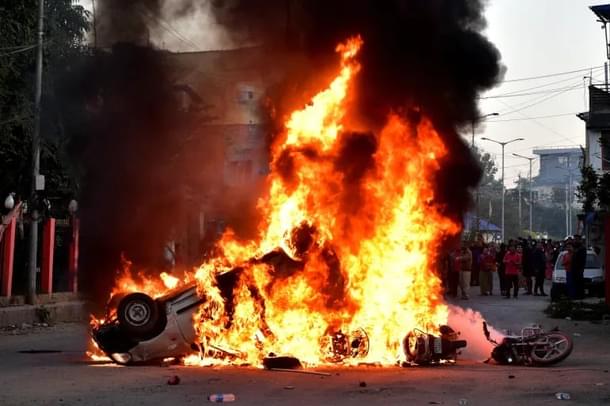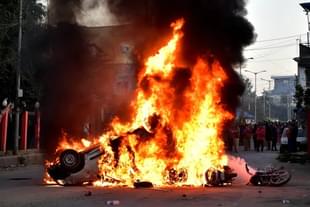North East
Half-Hearted Measures To Resolve Manipur Crisis Pushing State Towards Imminent Implosion
Jaideep Mazumdar
Nov 19, 2024, 02:59 PM | Updated 02:58 PM IST
Save & read from anywhere!
Bookmark stories for easy access on any device or the Swarajya app.


The smells and sights of fear and foreboding hang heavy all over the valleys, meadows and hills of Manipur.
Imphal, the capital city of the trouble-torn state, presents a picture of anguish, anger, helplessness and desperation that make for a volatile mix which threatens to singe the state like never before.
The scene is similar in the rest of the state, save for the areas in the hills dominated by the Nagas who have, largely, remained unaffected by the ongoing ethnic strife between Meiteis and Kukis.
The latest flare-up in the state was triggered by the murder of a woman belonging to the Hmar tribe (the Hmars identify themselves as part of the greater Kuki-Chin-Zo community) by cadres of Arambai Tenggol, a radical Meitei group, on November 7 in Jiribam district.
Kuki-Zo terrorists attacked a police station and a CRPF outpost in the same district November 10 in retaliation. The terrorists’ target was a Meitei village near the police station as well as a few dozen Meitei families who had taken shelter in the police station premises.
In retaliation to the attack by the Kuki-Zo terrorists, the CRPF shot dead 10 of them. But the remaining terrorists managed to abduct six women and children of a family.
The recovery of the bodies of the six, which included an eight-year-old girl and an eight-month old child, in neighbouring Assam over the weekend inflamed passions and led to angry protests, attacks on houses and properties of Ministers and MLAs and acute unrest among the Meiteis.
The response of both the Union and state governments to the latest crisis has, unfortunately, been merely bureaucratic.
The Union government deployed an additional 50 companies of central armed police forces (CAPFs) that added about 6,500 personnel to the 40,000 CAPF personnel already on the ground in Manipur. The state also had a huge number of Army and Assam Rifles troops, besides the state police.
The state government went by the copybook in imposing curfew in large swathes of Imphal Valley and suspending internet services.
But more boots on the ground, or imposition of prohibitory orders that are flouted with impunity, can never be the solution. Nor does suspension of internet services yield the desired results; in fact, it leads to circulation of wild rumours that further inflame passions.
As has been stated earlier by this writer, troops deployed in the troubled state have to be given the mandate to act proactively.
The security forces, and there are enough on the ground in Manipur, have to be given a free hand to launch an all-out offensive against Kuki-Zo terror groups.
At the same time, the security forces have to be told to crack down on Meitei radical group Arambai Tenggol and carry out a statewide hunt to recover all illegal weapons.
Thousands of weapons--looted from state police armouries, smuggled in from Myanmar and also country-made--in the hands of terrorists, insurgents and radical elements is the primary reason for the never-ending cycle of violence in the state.
Instead of mollycoddling Kuki-Zo terrorists, the Union Government must make it clear to the central forces to neutralise them. Kuki-Zo politicians, community leaders and civil society organisations have to be told in clear terms to stop supporting the terrorists and providing cover to them.
Simultaneously, Meitei insurgents also have to be neutralised. It must be made clear to leaders of both the communities that as long as illegal arms remain in the hands of terrorists, insurgents and vigilantes, the cycle of violence and country-violence will continue and bring untold miseries to both the communities.
With so many troops belonging to the Army, Assam Rifles, CAPFs and state police on the ground, it should not be very difficult to conduct a statewide mop-up of all illegal weapons. That would amount to effective and judicious utilisation of security forces.
So far, the Union Government has kept central forces confined to the unrewarding role of manning the ‘buffer zones’ that separate the two warring communities. But such a restraining role should not be the remit of the central forces; they have to be used to disarm and neutralise terrorists, militants and vigilantes.
New Delhi’s strategy of keeping the two communities--Meiteis and Kukis--at arm’s length while attempting a truce between them has not yielded any dividends.
That’s because both the sides, and more so the Kuki-Zo terrorists--have found it quite easy to breach the buffer zones manned by central forces and launch attacks on each other. Such attacks have triggered counter-attacks.
Creation of buffer zones that separate ‘Kuki areas’ in the hills from the Meitei-dominated Imphal Valley has, in itself, been a flawed tactic. It has encouraged the Kuki-Zo community to claim the hills as ‘Kukiland’ and demand that a separate state be carved out of Manipur for the community.
It has also encouraged the Kuki-Zo terror outfits to attack Meitei settlements in and adjoining the buffer zones in order to drive out Meiteis from those areas and extend the territorial limits of ‘Kukiland’.
Thus, the Union Government’s policy of physically separating the two communities has been counter-productive. It needs to be reversed, and urgently.
As already stated, all security forces have to be told to act in unison and launch a concerted offensive against Kuki-Zo terrorists, Meitei insurgents, radical outfits and vigilantes of both the communities. All those in illegal and unauthorised possession of arms have to be disarmed.
Only after this is done can peace have a chance. As long as both the communities have the power to strike at each other through the use of arms, there can be no chance of a dialogue between them taking off.
What is also important is that the security forces--the Army, Assam Rifles, CAPFs and state police--have to act impartially and without bias for or against any community.
What is also very important is that people with an intricate knowledge of the complexities of Manipur be given the responsibility of handling the security situation in the state.
Right now, the security apparatus in Manipur is being remote-controlled through babus in the Union Ministry of Home Affairs (MHA) through a few individuals who have little knowledge of Manipur. This needs to change immediately and the security apparatus in Manipur needs to be prised off from the stranglehold of the MHA’s babus.
If these corrective measures are not taken immediately, Manipur will surely implode. And the Union Government will be left with an anarchic state riven by civil war that it will have no control over. The blowback from inaction will have severe consequences even for New Delhi.





